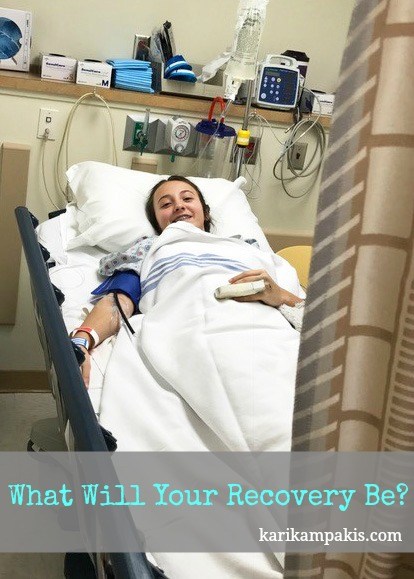What Will Your Recovery Be?

It started with a phone call – the kind of call every parent dreads.
The gym where my girls tumble had called to tell me that my oldest had hurt her finger and was in pain. It happened during a back-handspring and immediately started to swell.
We went to the ER, and after several hours we emerged with confirmation that she’d broken her finger and might need surgery. They scheduled us to see a hand surgeon on Monday.
Since the accident happened Thursday, we spent the entire weekend waiting and worrying. Besides the physical pain of a broken bone, we had to manage the emotional pain of what this might mean for her as a cheerleader – especially since her squad had tryouts the next week.
Many friends and visitors came by that weekend to keep Ella’s spirits up. They spoiled her with gifts, food, flowers, love, and attention. Again and again I tried not to cry, because my heart was so grateful for every individual who showed up during this vulnerable time.
On Monday we met with hand surgeons and chose the one who specializes in athletes. She recommended surgery on Tuesday, therapy starting Friday, and an estimated six-week recovery. It felt good to have a plan, yet I was scared. Somehow in my 14 years of parenting I’d never sent a child into surgery, so this was new territory.
By God’s grace her surgery went well, and her recovery has been smooth. Her bones are healing quickly as young bones tend to do. And while we’re not in the clear yet, we have reached a better place. I can look back now, reflect on the events, and process some lessons I learned.
One of the best insights came two days after Ella’s accident. A mom of five kids (all teenagers) had sent me an encouraging text. When I called to ask her a question, we talked about kids, trials, and dealing with the unexpected.
This mom said one thing they discuss a lot in their home is RECOVERY. Her husband’s big question to their five kids is, What will your recovery be? He tells his teenagers, “You’re going to make mistakes, and hard things will happen, but what will your recovery be? How will you respond when things don’t go as planned?”
I love this concept because it’s so relevant – especially to teens. More often than not, this is the stage of life when adult-sized problems, disappointments, and heartaches begin to manifest.
An accident you didn’t see coming.
A romance that ended in tears.
A mistake you’ll always regret.
A dream that didn’t come true.
A curve ball that changed your plans.
A setback that felt like punishment.
I’ve read many articles – you probably have too – about the importance of resiliency in kids. I’ve heard it said today’s kids often have high performance skills but low coping skills. Their talents and achievements are off the charts, but when it comes to the interior stuff, that grit that helps them handle the unexpected twists and turns of life, it often doesn’t develop to a mature level.
I’m all for resiliency, but I don’t like watching the adversities that help build resilient kids. I don’t enjoy seeing my kids or others face bumps in the road or mountains that put their character and resolve to the test.
What I’m trying to grow more comfortable with, however, is the truth that pain and life interruptions can serve a purpose. The obstacles our kids face often prepare them for blessings down the road or open up new doors they didn’t see coming. Most importantly, God will comfort them in their pain so they can comfort others. Whatever happens to our kids – good or bad – never goes to waste. God can use it all to grow His kingdom and draw them closer to Him.
The first stage of recovery is rarely a pretty sight. It’s usually complicated, messy, and unpredictable – even for us parents, who are often caught off-guard by how emotional or deeply sad we feel when our child is struggling or upset.
It’s the worst feeling to witness a child’s pain, physical or emotional, and what I’ve come to conclude is that there are head truths and heart truths. Sometimes our head is ahead of our heart. Even if our mind can think rationally – this too will pass, he/she will be fine, we’ll make peace with every potential outcome – our heart can feel conflicted. We have to give ourselves room to honestly process our emotions so we can effectively help our child.
I believe helping a child recover begins with compassion and sensitivity. It means comforting them, crying with them, and confirming we’ll walk beside them. Whatever the next steps are, we’ll take that journey with them, because as long as we’re alive and able they will never walk alone.
The next step is to instill hope. To give them something to cling to and remind them how the pain they feel is temporary. It won’t last forever, and things will get better. The temptation in any adversity is to believe we are stuck. To let our mind wander to dark places and stay there.
But progress is made when we purposefully wrap our mind around key positive thoughts. Progress is made in baby steps. Progress is made when we commit to pressing forward and trust God to write a story that incorporates every single detail.
Nobody is guaranteed a problem-free life, and what every child realizes at some point is how fragile life circumstances can be. How bodies, hearts, and spirits can break from one unfortunate event…one devastating conversation…one poor choice…one bad performance…one painful punch in the gut.
We can’t always prevent the trials our kids face, but we can influence their next chapter. We can empower them by asking, What will your recovery be? How will you make the best of this situation? What choices will you make from here that keep you moving in the right direction?
And then, we can celebrate their recovery. We can applaud them as they work diligently to bounce back and move forward. What happens after those hard events are the stories that build grit and character. This is where resiliency grows and gets a chance to reveal itself as our kids are forced to dig deep to find the faith, resolve, and strength that can only come from God.
Some of my proudest parenting moments have been watching my kids work through their trials. When they grow up and look back on their lives, I believe the trials they overcame will be some of their proudest moments too. Wounds in the process of healing are different than wounds that have healed, and ultimately our favorite stories to tell are always the stories behind our scars, the scars that prove what we once went through and remind us of how far we’ve come.
******************************************************************************************************************************
Thanks for reading this article today. If you found the message helpful, please share it through social media.
I’m grateful for my readers and would love to connect. You can subscribe to my blog, join my Facebook community, or find me on Instagram, Twitter, or Pinterest.
Also, I’ve written two books for teen & tween girls designed to empower them through faith. The newest one, Liked, is getting a fantastic response as a unique resource for girls of the digital age, and along with the bestselling 10 Ultimate Truths Girls Should Know, it’s being used widely across the U.S. for small group studies.
Have a great day, and thanks again for stopping by!
Posted by Kari on March 12, 2017










You have no idea how timely and helpful this article is to me. My daughter (14 ) who is a competitive swimmer was so exited to compete in her championship swim meet next week. She trains 6 days a week. Close to 2 hours a day .In gym class 🙁 (volleyball game ) her hand was hit by another student and we learned that a bone in her hand is broken. Six -eight weeks with a cast . She was deviated not only because she will miss her meet but (probably like tumbling or gymnastics ) 6 weeks of not training in swimming is not easy to bounce back from. I have been trying to think of what good can come out of this . Yes, it is so minor in the whole scheme of the many huge problems some people have. But, to her, this is so important . For me, it is difficult as well, because I know how hard she has worked . The article helped me so much because as difficult as it is for her right now , in the end, if this blip can help her cope with bigger issues down the line or she develops an empathy in which she can help others in a similar situation than it is so much easier to be optimistic and hopeful.
Thank you for sharing !!!
I enjoyed reading your perspective. I sent my oldest son into surgery at about 10 months of age after he and my husband took a fall and it broke his leg. Being so small, he had to be sedated to be casted. In Kindergarten, he fell off the monkey bars during the 2nd week of school, broke his elbow, and had to have surgery to pin the bones at the growth plate. AT the end of that same school year, he fell off his bike, broke his elbow again, in the same place, and ended up with the same surgery. Last summer, as a 14 year old, his foot was sliced open by a Stingray at the beach. Needless to say, my mom skills have been tested. However, I feel like my son has a clearer understanding that God is always with him. When he was 6 and going into surgery, he was scared and wanted me to come with him, so I was able to remind him that God was not going to leave his side and he could say a prayer and tell God his fears. We joked once about his Guardian Angel not being very good at his job. His response was “Are you kidding? I have a great Guardian Angel- I haven’t died!!” I can’t keep my son in a bubble, and he is not afraid to try anything, which is one of my favorite things about him. It’s good to know that God always has him!!
As an Occupational Therapist and boy mom of kids who have broken more bones than I can count – I appreciate you posting the OT hand specialist in your blog ! Our job is to help a person handle life while regaining the range of motion and decreasing the edema and pain but also get back to the job of living ! ( cheerleading , gymnastics- driving ) these hiccups in life help us all appreciate what we have. Our school recently hosted a lecture on how to raise a resilient kid . Such a very very important skill for all of us !